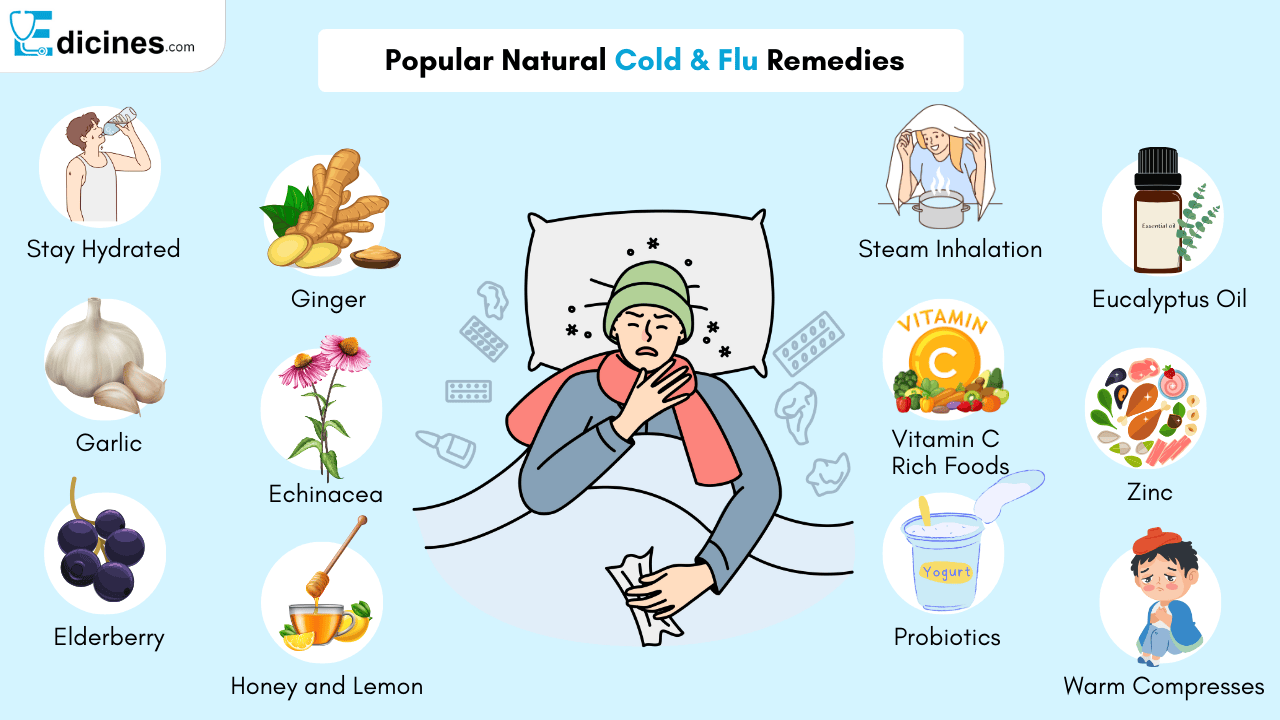The common cold is an upper-respiratory tract infection that is a major annoyance to physically fit people. It is caused by numerous pathogens, with rhinoviruses being the most prevalent. Common cold symptoms include a runny or blocked nose, fit of sneezes, sore, itchy throat, bad cough, feverish headaches and weakness lasting about a week if not treated.
There is no cure for the common cold, but there are treatment options available that can relieve the symptoms and help the body heal. This blog looks at treating the common cold, with an emphasis on hydration, herbal remedies, essential oils, and lifestyle changes.
What is the Common Cold?
The common cold is a viral infection that affects the nose, throat, and bronchi, and can spread to the sinuses and the respiratory system. It is a highly contagious disease spread through both direct and indirect, such as coming into contact with an infected individual, inhaling aerosol droplets dispersed by the infected person, or using the contaminated surfaces.
Common Cold Symptoms
Factors that are easily associated with the common cold include:
- Runny Nose/Congestion of the Nose
- Sore Throat
- Cough which can become chronic.
- Tend to sneeze a lot
- Pain in the head region.
- Pains in the body that are not severe.
- Tiredness
- Fever that is not high
These typical, self-limiting symptoms are usually of little help in diagnosis but may be quite distressing especially in the early days of the illness.
How Long Do Colds Last?
In general, duration of a cold typically lasts around seven to ten days. The first three days are the most affected, with several symptoms such as cough and a running nose reaching their maximum. It is on the fifth day that most people start showing good signs of recovery from the illness although they may experience a cough or tiredness for three days more.
Various factors, including such elements as up or below ten of age, healthy immunity, and the presence or absence of comorbidities, may determine the duration of the illness
Also Read: Top 10 Natural Ways to Boost Your Immune System
Natural Treatments for Common Cold

Stay Hydrated
The common cold is manageable, and the first step in its management is, no doubt, drinking enough fluids. When one is healthy and active, hydration assists in the easy and efficient elimination of mucus. It aids every other system in the body, including the one dealing with the infection because it prevents the loss of fluids when the individual has a fever or sweats profusely. Hydration is vital because it supports the immune system and helps the body resist viral attacks
What Fluids Can Be Taken?
- Water: The easiest and the ideal option of staying hydrated.
- Herbal teas: Consuming tea made with chamomile, mint or ginger will help ease a sore throat and clear congestion.
- Warm broths: Chicken stock and vegetable soups can help keep you hydrated.
- Clear soups: These are hydrating and non-irritating in the throat or chest even when congested.
Avoid Dehydrating Drinks
Staying away from drinks that may cause dehydration. Some drinks should be avoided because they serve to dehydrate the body, aggravating even more cold symptoms:
- Caffeinated drinks: Coffees or energy giving drinks irritate the bladder and as a result cause frequent urination which leads to possible dehydration.
- Alcohol: It is self evident that alcoholic drinks generally induce diuresis and also act to further depress one’s immune system.
Herbal Remedies
Here are some effective herbal remedies for colds and flu.
Ginger
Ginger is famously reputed for its anti-oxidative and anti-inflammatory properties making it one of the best remedies for the cold season. Ginger tea provides comfort with throat pain relief, respiratory system inflammation, and even nausea that sometimes accompanies cold; and this is why it is consumed most often. One more help which ginger can provide is fighting the cold virus through its antiviral properties.
Garlic
Garlic is another remedy that most of us might be familiar with- that due to its immune system enhancing properties, has effectiveness on infection, bacteria, and viruses in the body. Eating any amount of fresh or cooked garlic or its combination with the food can help not to get ill for a long time. In addition, Garlic encourages immune cell production, helping the body fight off the infection more efficiently
Echinacea
Echinacea is one of the herbs which is popularly used to ease the symptoms and the duration of infections specifically the common cold. Studies have shown that the use of echinacea’s primary active constituent can enhance the functionality of the immune system, thus preventing the onset of colds, and when started early in the course of illness, colds are resolved faster.
Elderberry
Elderberry is one of the most well-known member of the elder’s family. This family has high levels of antioxidants and was traditionally used in folk medicine to deal with coughs and flu. Elderberry syrup is also offered to relieve the symptoms of the cold and there is evidence that this syrup also shortens the episodes of colds. Elderberry also enhances immunity and therefore can be taken proactively during the cold periods.
Use of Essential Oils
Peppermint oil
The oil of peppermint is famed for its capability of easing headaches and unclogging blocked sinuses. Inhalation of peppermint oil through a diffuser or the application of diluted oil to the temples can offer instant relief from a stuffy nose.
Eucalyptus oil
Eucalyptus oil is most helpful in relation to respiratory health. It helps to open airways, offers relief from inflammation and distresses associated with breathing. Eucalyptus oil can be inhaled through steam inhalation or can be diffused to relieve any nasal congestion.
Tea Tree oil
Tea tree topical antibacterial and antiviral properties can help cold symptoms. While tea tree oil should not be eaten or taken internally, it may be used diluted for topical application or for steam to prevent cold and relieve blocked nose.
Methods to Use Essential Oils:
Diffusers: Use a continental oil diffuser to dissipate therapeutic oils into the room by adding some oil drops into that appliance.
Steam Inhalation: The process of introducing heat and moisture to the respiratory tract by using essential oils, water and inhalation.
Topical Application: Essential oils are normally diluted in a carrier oil and rubbed on the chest or the neck in order to relieve nasal congestion.
Nutritional Support
Vitamin C
Vitamin C has a significant impact on the enhancement of resistance to infections and the alleviation of the symptoms of common colds. A rough estimate puts the content of vitamin C in milk, oranges, lemons, pomelos and grapefruits, bell peppers, and strawberries, as well.
Include as many vitamin C sources in your diet as you can withstand as it boosts the body’s anti-cold activity.
Zinc
Zinc is a trace element important in the function of the immune system, and it is efficient when the cold is about to manifest by lessening cold symptoms. To reduce a cold, zinc supplementation by ingesting meat, seeds and legumes, and others containing zinc, is highly recommended.
Foods With High Levels of Antioxidants
Incorporating high antioxidative foods such as berries, nuts, and green leafy vegetables helps to externalize oxidants that cause consequent illnesses, hence enhances recovery of the immune system even during illness.
Probiotics
Probiotics in fermented foods such as yogurt, kefir and sauerkraut help in promoting gut health. This is particularly important, as the immune system carries a large portion of the body’s defenses within the gut.
Also Read: 30-Minute Home Workouts for Busy Schedules
Rest and Recovery
Importance of Sleep
In the process of dealing with a cold, Sleep is considered to be very fundamental. Taking appropriately balanced sleep also aids the organism in the production of defence cells thereby enhancing healing. This is due to the fact that when this organism is well rested, it has the capacity to resist the invading virus more effectively.
From the consideration of better sleep in all, Make your bedroom as quiet and dark as possible. Take additional pillows to rise your head and lessen congestion of the nostrils.
Sleeping when ill does not require one to alter the sleeping habits.
Also Read: Common Sleep Disorders and How to Treat Them
Mindfulness and Relaxation
Mindfulness techniques like meditation and deep breathing are useful in combating stress as well as boosting the immune system. It is important to prevent stress as it will incapacitate the immune system and the recovery period will be longer than necessary.
Home Remedies and Lifestyle Modifications
Warm Compresses
It is possible to relieve sinus and headache pain by placing heat pads on the sinuses. This simple remedy works by applying heat, thereby increasing blood circulation in the affected area, decreasing any swelling present and discomfort caused by blockage of the sinuses.
Saline Nasal Rinse
Saline nasal gargles are just one illustration of the many available treatment options for nasal mucus blockage. It may additionally assist in promoting inflammation of the within surface of the nose which further aids breathing.
Steam Inhalation
Steam inhalation is one of the very age-old practices which seem to work without much effort for colds. Nasal congestion is relieved by easing the thick mucus. A few drops of essential oils like eucalyptus or peppermint will also help.
Lemon & Honey
Lemon and honey have become people’s favourite ingredients in treating cough cases. Sore throat treatments with these two home products are as readily available as the cough itself. Honey is known as a natural germ killer whilst lemon serves vitamin c.
When to See a Doctor?
All natural treatments work most of the time as well. However, there are conditions when a patient will have to be attended to by a medical practitioner.
If any of the following happens, a doctor should be contacted immediately:
- Symptoms last for longer than ten days.
- Patient experiences a high level of fever along with severe headaches, earache and breathing difficulties.
- The condition deteriorates instead of getting better.
- Patients who have low immunity, some illness or the old aged should not delay medical treatment even if it is only for a cold.
Conclusion
Although there is no known cure for the common cold, home remedial measures can lessen the intensity of symptoms, improve immunity, and quicken healing. Water intake, the use of herbs and essential oils instead, proper dieting, and ample rest will lessen the impact of the cold and enhance coping with it. If symptoms persist or worsen, it’s important to seek professional medical advice.













